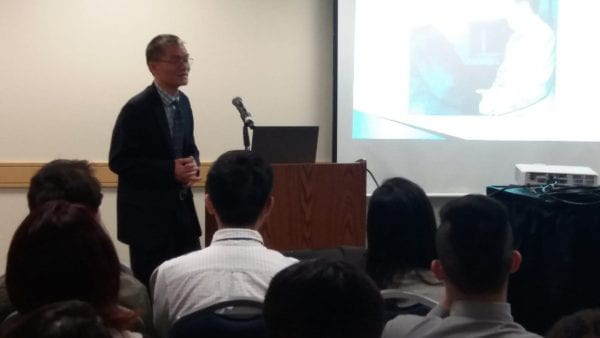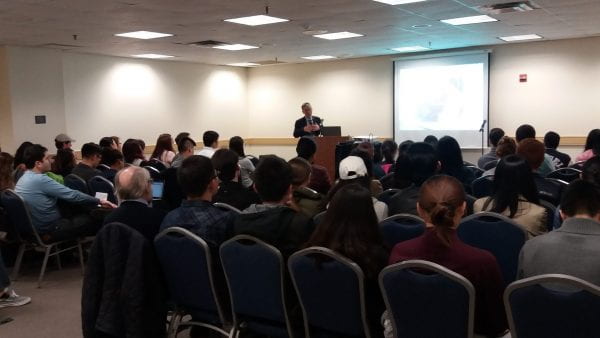Critique on Major Presidential Candidate’s Policy Against North Korea
Yuchan Kim
For the first time in the history of constitutional government, the 18th President, Park Geun-hye was officially impeached by the Constitutional Court on March 10th, and the National Election Commission officially announced May 9th as the 19th Presidential election. With the impeachment as a lesson, many now recognize the importance of casting a ballot, and it is anticipated that the voting rate will be much higher than that of previous presidential elections. Each voter must compare policies of different presidential candidates and to take those into account when casting a ballot. There are various pledges and policies that each presidential candidate has promised; however, in this article, the policy against North Korea will be discussed extensively as this policy is closely associated with our national security.
First major presidential candidate as well as the forerunner of most of the polls, Moon Jae-in from the Minjoo’s Party, is likely to take on a warmer approach to North Korea. In an interview, he discussed about how visit to North Korea is his top priority[i]. Moreover, Moon emphasized that Kaesong Industrial Complex (KIC), which was closed-down in 2016 by former President Park Geun-hye, will be reopened, re-operated and further be expanded[ii]. He criticized how hardline policy, which is majorly centered around the sanction, did not solve any problem but caused North Korea to be more dependent on China. In regard to Moon’s pledge of how to deal with North Korea, it seems to be very redundant and unrealistic. First, visiting North Korea requires a legitimate reason that all nations, especially United States, can accept. Furthermore, in this midst of escalated tension, it is highly unrealistic for the top official of a nation that is an adversary to North Korea to safely visit Kim Jong-un. Also, fundamentally, if Kim Jong-un doesn’t want to hold a dialogue (Kim never had a summit with other nations), this visit can be cancelled right away. In regard to KIC, reopening and expanding it will once again bring criticism of investing in North Korea’s missile and nuclear technology; moreover, many enterprises will most likely not invest in KIC as it is prone to shut-down and is highly unstable. Granted, hardline policy was not sufficient in dealing with North Korea, but Moon has to provide more realistic measures.
Another leading candidate from the Minjoo Party, Ahn Hee-jung, emphasized how policy against North Korea must be a mixture of dialogue and pressure along with the international community[iii]. However, I highly doubt whether this policy can be implemented as I view these two elements being contrary to each other. If there is certain pressure, the possibility of holding a dialogue is very slim; moreover, Ahn Hee-jung has to legitimately persuade United Nations Security Council to withdraw or lessen the current level of sanction. Would Trump administration, which is very concerned about North Korea’s recent launch of ballistic missiles, accept this proposal? Highly not. Therefore, Ahn’s statement about incorporating both engagement and hardline policy seems just to gain support from both sides. He needs to cover more details about his policy.
Ahn Cheol-soo, another presidential candidate from People’s Party (third-largest) has emphasized dialogue along with multilateral talks[iv]. However, there has been a failed incident of multilateral talks such as Six Party Talks; furthermore, Ahn’s policy of increasing military spending and continuing THAAD deployment will surely discourage both North Korea and China from participating a multilateral talk with South Korea and United States[v]. Therefore, if Ahn wants to implement such policy, he needs to reconsider his position on military policy or needs to compromise (take other nations’ interests into account) with participating nations such as China.
To sum up, every candidate’s recommended policy against North Korea has an area of criticism; however, one thing that all candidates must seek is to prioritize our national security before they make any pledge; moreover, I, as the citizen of Republic of Korea, want to see sincere, realistic pledges rather than pledges that targets for mere popularity.
[i] Ahn, J. (2016, December 15). Leading ROK presidential candidate to visit N. Korea if elected. Retrieved April 04, 2017, from https://www.nknews.org/2016/12/leading-rok-presidential-hopeful-wants-to-visit-n-korea-if-elected/
[ii] Ji, D. (2017, February 10). Moon pledges major Kaesong Industrial Complex expansion if elected. Retrieved April 04, 2017, from https://www.nknews.org/2017/02/moon-pledges-major-kaesong-industrial-complex-expansion-if-elected
[iii] Fifield, A. (2017, March 04). Little-known governor runs as the hope and change candidate in South Korea. Retrieved April 04, 2017, from https://www.washingtonpost.com/world/asia_pacific/little-known-governor-runs-as-the-hope-and-change-candidate-in-south-korea/2017/03/03/6d2b8e76-fe99-11e6-9b78-824ccab94435_story.html?utm_term=.b2ca406c948c
[iv] Presidential hopeful eyes multiple levels of dialogue with North Korea. (n.d.). Retrieved April 04, 2017, from http://english.yonhapnews.co.kr/national/2017/03/02/0301000000AEN20170302010700315.html
[v] People’s Party may soften stance on THAAD. (2017, February 21). Retrieved April 04, 2017, from http://www.koreatimes.co.kr/www/nation/2017/02/356_224410.html












